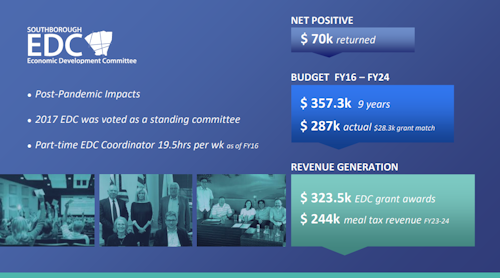Above: Town officials will try to make a case that the Town’s investment in Economic Development has had some dividends but we need to spend more to make more. (image from presentation)
At their joint August 27th meeting, the Select Board Chair warned the Advisory Committee that Southborough is “bleeding businesses”. Referring to the situation as an emergency, she advocated for the Town to invest in a solution.
Article 14 at Monday’s Special Town Meeting will ask voters to support funding increasing the hours of the part-time position of the Coordinator for the Economic Development Committee to become a full-time one.
If approved, the Article would allocate $27,929 of the FY25 Town budget to cover the additional salary and benefits associated with the full time position for the second half of the year. Town officials advocate the short term costs is necessary for bringing down long term costs for Southborough home owners.
In the Warrant, the Select Board pitches:
Building Southborough ‘s commercial tax base is a key factor in easing pressure on residential property tax rates. This can be done by attracting and retaining businesses in Southborough, which is a primary function of our Economic Development Coordinator. We have historically been underfunded in this area, with one part-time Economic Development Coordinator and we have lost a number of important businesses to other towns who have much more robust economic development departments. These additional hours for our Economic Development Coordinator will make us more competitive in this area, and should produce additional commercial tax revenue.
The slides they plan to use in their presentation are below:
In August, the Select Board hosted a discussion with the EDC and the Advisory Committee on the Article. The board had already fully pledged its support. The discussion was an effort to get support from Advisory, which had yet to vote on its position. (Spoiler: They got it.)
Select Board Chair Kathy Cook spoke of the need to increase the commercial tax base by attracting and retaining businesses. She warned:
we’ve now got an 85% residential tax base it’s gone up from 80 to 85 the last few years some of it’s Covid related but the entire tax base is pretty much falling on houses
To help make their case, the EDC brought in former members Julie Connelly and Claire Reynolds.* They spoke about the volume of work that it takes to successfully develop relationships with businesses in town, help existing and potential businesses navigate the Town’s zoning and permitting, and work on solutions for problems that stand in the way of commercial development.
Connelly reminded that the EDC was first allowed to budget a part-time coordinator in 2016 for 19.5 hours per week. She said there is consistently too much work for coordinators to get done in that time. They are on their fourth coordinator. (One was a contractor, and two employees relocated out of state.)
Connelly spoke about the need for improving the wastewater issues on Route 9. (That’s something that several members of the Select Board and Advisory agreed with.)
But she also stressed the need for investing in efforts to improve zoning bylaws. She gave the example of a fitness business that was forced to leave town, because the approval process for in town locations would have taken too long. (You can read her letter to the editor on that subject here.)
Select Board member Al Hamilton echoed the point, saying that Southorough’s zoning needs replacing, “essentially a clean sheet of paper and brought into the 21st century” with more by-right options for businesses. He followed:
we’re sitting here at the intersection of 495 and the Mass Pike and Route 9 and we can’t attract businesses to come to Southborough. We don’t have a grocery store. We don’t have a hardware store. We’re losing restaurants. . . We don’t have entertainment venues. We don’t we have an in industrial park — that’s empty. . . we got to stop doing what we’re doing, because it ain’t working.
Members noted to the closing of then restaurant Tomasso Trattoria.** Town Administrator Mark Purple confirmed that the revenue loss for losing that business was a “double whammy” since the town also lost meals tax revenue.
Advisory Chair Andrew Pfaff said he supported making the investment in hope of success. But he recommended that they keep an eye on how things are going and reevaluate in a few years “to make sure that we’re not putting good money after bad. . . If we’re still headed in the wrong direction then maybe a coordinator position isn’t the right type of solution”.
Pfaff wanted to work on understanding what success would look like. He acknowledged that since metrics may be difficult, and it might come down to anecdotes that show they are moving in the right direction. Advisory member Larry Samberg was in favor of coming up with actual metrics to judge by on a regular basis.
Advisory member Marci Jones later highlighted that a lot of the EDC’s work is behind the scenes. She pushed the need to increase their visibility in order for the town to get behind them.
Jones gave an example of attending Planning Board meetings to advocate for businesses. She pointed to the car condo that went through the Site Plan Review process with the Planning Board.*** She said it would have been great for and EDC Coordinator to explain to the board that you can’t have a business like that where you expect a right turn on Route 9 to end at 8:30 pm.
Jones wasn’t the only one concerned about elevating EDC’s public image. Reynolds had referenced “a lot of misconceptions about EDC”. And Howard Rose said he thinks that EDC has a PR problem they need to solve.
EDC Chair Michael Nordstrom agreed that more marketing is needed. But he said a key part of that is doing the work, which takes a lot of time.
Connelly explained that PR they used to do had waned based on turnover on the committee, with fewer members and less institutional support. She described committee members as having felt demoralized by their committee not having the power to take certain actions and not having support from other boards that had the power. That included the lack of support from prior Select Board members who voted down their requests for a full time coordinator.
Select Board Member Andrew Dennington explained that when the request previously came up for a full time position that would have split hours between the EDC and coordinating grant opportunities, the Personnel Board had felt it was too complicated. The former Personnel Board Chair, Advisory member Barry Rubenstein, spoke up to explain that the perception had been that there wasn’t enough EDC work for a full time job. He wanted to understand if things changed.
Connelly said they always had more work than enough work for a full time person. She explained that the coordinator position included a lot of grant writing. Because the EDC doesn’t work in a silo, many grants overlapped the work of multiple boards who weren’t responding to the coordinator with information needed to bring some of the grants to fruition. Pursuing the split position had been their “creative approach” addressing that issue and getting more hours of support. (She noted that it was obviously not successful.)
Cook chimed in that it had been an effort to get the full support of the Select Board since some members weren’t in favor of paying for a full time EDC Coordinator. So, they “dangled” the inclusion of a grant writer to bring in more money for the town. But it didn’t work.
Reynolds said the state has made a lot of changes since then, making it much easier to apply for multiple grants.
Current coordinator Leah Emerson explained that one important part of her role is representing Southborough at business and regional planning organizations. But trying to do that and relationship building along with the other coordinator work takes a lot of time. She said, “I do bump up against those 19 and a half hours more often than not, and I I would really like to be able to do more to help the town.”
The Select Board and Advisory Committee unanimously voted to support the Article.
For more coverage of the upcoming September 30th Special Town Meeting, click here.
*Julie Connelly was an EDC member for ten years. Claire Reynolds is a former member who has also worked for the committee as a consultant.
**On July 3rd, the restaurant posted on Facebook that it suddenly closed that day for the week due to a water break and the coming holiday. The restaurant never updated its Facebook page or website to show that it permanently closed. But they appeared to never reopen. Weeks later, residents reported that there was a “permanently closed” sign on the door. A few weeks after that, someone posted photos on a private Facebook group of the completely cleared out space, looking for a new business to lease it.
In a recent Community Advocate article, landlord Bill Depietri is quoted as having said a new restaurant tenant is expected to open in the space by the end of the year.
***The Parkhaus (Luxury Car Condos Car Condo business coming to 241 and 245 Turnpike Road (the long vacant Andrea Restaurant and abutting property) received a Major Site Plan Approval in May 2023 then a a year long extension in May 2024. According to a recent Community Advocate article, the business has yet to apply for permits to do the construction work.
Updated (9/27/24 3:38 pm): Initially, I was told it would add to the FY25 budget. But when I followed up to understand the actual tax impact, I learned that technically (as written), it wouldn’t impact the tax bills for FY25 whether it passes, fails, or is indefinitely postponed.
The Article seeks payment by transferring unneeded “overlay” funds. (The bigger tax impact would be to the FY26 taxes if approved as part of the budget at Annual Town Meeting in the spring. That would include the full year’s increased salary an benefits, which is double the cost listed in Article 14.)




